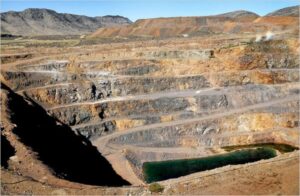 As the age of the internal combustion engine draws to a close the starting gun has been fired on a new race — and China is already way out in the lead. Beijing already controls much of the supply chain for rare earths metals and minerals. By contrast the UK has no policy in this area. What remains of our automotive industry is therefore ill placed to compete globally and when new investment opportunities arise. When carmakers decide where to place their electric vehicle plants are they really going to place them within the UK’s borders or close to a battery manufacturer? Even more disturbing, however, is the realisation that rare earth magnets — essential for missiles and fighter jets — are also in the grip of the Chinese.
As the age of the internal combustion engine draws to a close the starting gun has been fired on a new race — and China is already way out in the lead. Beijing already controls much of the supply chain for rare earths metals and minerals. By contrast the UK has no policy in this area. What remains of our automotive industry is therefore ill placed to compete globally and when new investment opportunities arise. When carmakers decide where to place their electric vehicle plants are they really going to place them within the UK’s borders or close to a battery manufacturer? Even more disturbing, however, is the realisation that rare earth magnets — essential for missiles and fighter jets — are also in the grip of the Chinese.
Neodymium and praseodymium — crucial for laser rangefinders and guidance systems — are two particular elements policymakers in the UK should be focusing on. Another is lanthanum, which is useful for night vision goggles. Without them we literally would have an outmoded defence infrastructure — and currently China can control the quantity we can access. The solution is for the UK to follow the US in creating a bespoke strategic minerals supply chain. This shouldn’t be difficult to do. After all, London is the centre of global mining finance and home to a thriving natural resources ecosystem.
The commonwealth connections could really assist us here. As an investor in the mining sector, we see many projects ideally suited to this strategy in Australia, Africa and the Americas. But it requires cash and commitment. The US, for example, is committed to investing up to $80bn to this cause via its International Finance Development Corporation. Japan has just announced that it is tripling its inventories from 60 to 180 days of consumption.
Furthermore, when we consider our “greener future”, a future powered by the supply of rare earth materials, we must not forget to give thought to the social and environmental cost of their production and utilisation. By importing from China, we have no understanding of how workers were treated in their extraction, or how much carbon was expelled, or how sympathetic to the local environment China’s mining practices have been. By taking control of its rare earth materials supply chain, the UK government could also tighten the environmental, social and governance (ESG) controls applied to extraction.
While there is certainly work to do to improve the west’s performance on ESG, a topic which is now critical for investments, it is questionable as to whether there is such concern in China, where the ethical and environmental cost of mining has been reported to be secondary to the result of acquiring the material. China’s State Council has reported that the country’s rare earth operations are causing significant environmental problems in terms of pollution, acidification, soil erosion and even waste water — with high concentrations of radioactive residues cited as an unwanted effect of rare earth extraction. When looking at the issue of rare earth extraction purely from an ethical mining standpoint, the west must arrest China’s dominance of the resource — particularly as demand continues to soar.
Source: “The UK needs to shore up its strategic mineral supplies”, Financial Times
